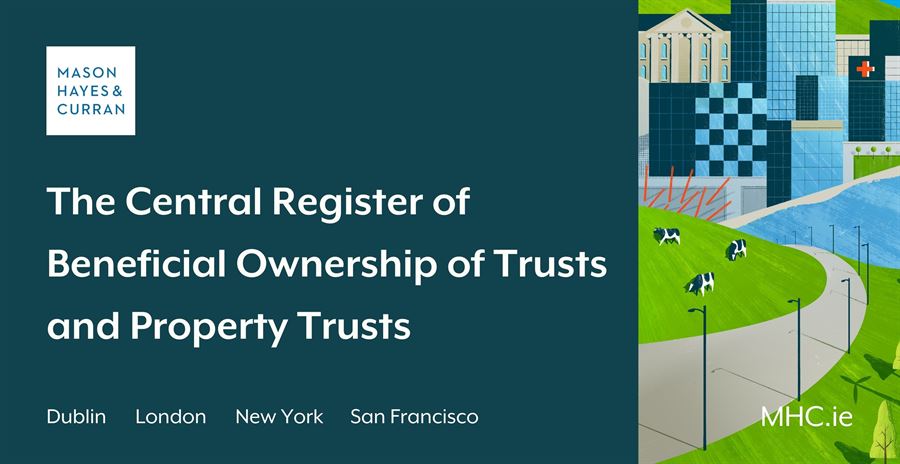
New regulations are in place relating to trusts based in Ireland and the identification of their beneficial owners, the EU (Anti-Money Laundering: Beneficial Ownership of Trusts) Regulations 2021 (the Regulations). The Regulations implement an EU directive on anti-money laundering measures and have a very wide scope.
If you are the trustee of a trust holding Irish real estate, the Regulations are likely to apply to you.
Trusts to which the Regulations apply (relevant trusts)
The Regulations apply, with narrow exemptions, to all express trusts which are established by deed or declaration and:
-
whose trustees are resident in Ireland
-
which are administered in Ireland, or
-
which are not administered in the EU but whose trustees, acting as trustees either enter into a business relationship in Ireland, or acquire land or other real property in Ireland in the name of the trust.
Obligations on trustees
Trustees of a relevant trust are obliged to identify the beneficial owners of their trust. This is to keep certain particulars of those beneficial owners on an internal register and from 23 October 2021 to file details of those particulars on a central register administered by the Revenue Commissioners.
Who are beneficial owners?
For most types of relevant trusts holding property, the beneficial owners are:
-
any individual who is entitled to a vested interest in the capital of the relevant trust property
-
the class of individuals in whose interest the trust is set up or operates
-
any individual who has control over the relevant trust
-
the settlor
-
the trustee, and
-
the protector.
Certain types of charitable trusts, sports clubs and trusts established under Wills have slightly different definitions of beneficial owners. You can see our article on charitable trusts [here].
Additionally, where a beneficiary of a relevant trust is a “legal entity”, for instance a company, the trustees must find details of the people who own or control that entity. If the entity is a company which has made filings on a register of beneficial ownership in the EU the trustees are obliged to obtain information about that company from that register. This could include, for example, an Irish company which has made filings on the Central Register of Beneficial Ownership of Companies,
If the legal entity has not made any such filings, e.g., it is an American corporation or a UK company, the trustees must obtain the particular of “any individuals constituted through that legal entity”. In practice, this will mean the people who ultimately own or control it.
Particulars to be obtained
The trustees should obtain the following information on their trust’s beneficial owners:
-
Name
-
Date of birth
-
Nationality
-
Residential address
-
PPS or other identifying number, and
-
Nature and extent of the interest held or control exercised.
This information must then be filed on the central register. Where the trust has a beneficiary who is a legal entity, the information above must be obtained and filed
Who has access to the registers?
The following have access to a trust’s internal register:
-
Garda Síochána
-
Revenue Commissioners
-
competent authorities
-
Criminal Assets Bureau, and
-
designated persons who deal with the trustees in their capacity as trustees.
Designated persons are organisations, like law firms and banks, which have to carry out customer due diligence on their clients. Competent authorities are the governing bodies of those organisations, such as the Law Society or the Central Bank.
An Garda Síochána, the Revenue Commissioners, competent authorities, and the Criminal Assets Bureau are also entitled to access all information on the central register. Designated persons are entitled to restricted information.
Other people are also entitled to access to restricted information, but only if they can show the Registrar that they have a legitimate interest in that information. To demonstrate a legitimate interest, the applicant must show that:
-
it is engaged in the prevention, detection or investigation of money laundering or terrorist financing activities
-
it is seeking to inspect the information for the purposes of prevention, detection or investigation of money laundering or terrorist financial offences, and
-
the trust concerned relates to persons convicted of an offence consisting of money laundering or terrorist financing or hold assets in a high-risk country.
A legitimate interest can also be shown where the relevant trust holds or owns a controlling interest in any corporate or other legal entity incorporated outside the EU, whether through direct or indirect ownership, including through bearer shareholdings, or through control by other means.
Conclusion
Failure to comply with the Regulations can carry criminal penalties and Trustees of trusts which own Irish real estate should be aware of their obligations and take appropriate action. If you would like further advice, please contact our Corporate Governance and Compliance Department.





